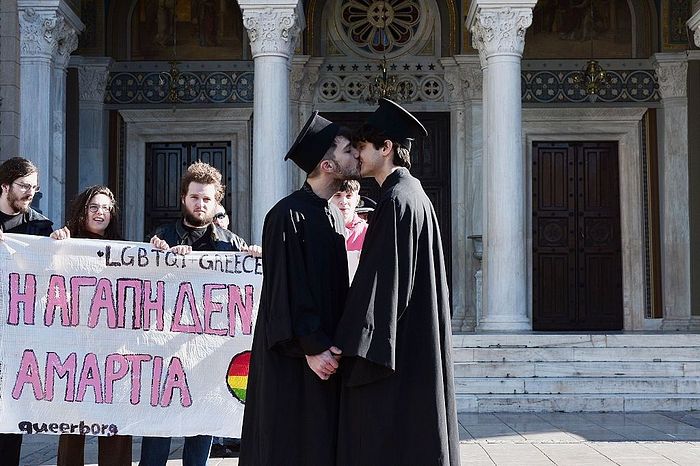Source: The American Conservative
January 4, 2020
 Gay rights activists dressed up as Orthodox priests kiss next to the Metropolitan church in Athens on December 22, 2015. (LOUISA GOULIAMAKI/AFP via Getty Images)
Gay rights activists dressed up as Orthodox priests kiss next to the Metropolitan church in Athens on December 22, 2015. (LOUISA GOULIAMAKI/AFP via Getty Images)
By now, it’s crystal clear that whenever theological liberals invite theological conservatives to “dialogue” about sexual ethics, what’s really being negotiated is the terms under which conservatives can be persuaded to surrender. If there is a dialogue to be had among Christians, it’s how best to proclaim and to help people live out the countercultural truth about sex and the body in these post-Christian, erotomaniacal times. That’s not the dialogue that interests theological liberals; “dialogue” is what they want up until the point where they hold power, in which case the dialogue is over, because the Holy Spirit has done something new in the church, and we cannot give bigotry any quarter.
There’s a liberal website called Orthodoxy In Dialogue, which is exactly what you think it is. A couple of weeks ago, there appeared a controversial essay from an Antiochian Orthodox priest in Wichita, which is known for being a conservative jurisdiction. In the essay, Father Aaron Warwick calls for the liberalization of Orthodox pastoral practice regarding homosexuality. An Orthodox reader e-mailed the piece to me, with real dismay. This paragraph from the Warwick essay caused me to do a double-take:
In reality, I believe we should also accept that, like most heterosexuals, most homosexuals will find lifelong abstinence to be impracticable. In such cases, it is my strong conviction that we should encourage homosexuals to find a lifelong partner. While I understand this offends the sensibility of many Orthodox Christians, I again point to how our Church has dealt with the sin of divorce and remarriage. Namely, we do not enforce the strict legal and scriptural injunctions of our Church; rather, we act in a pastoral manner, allowing people an opportunity to continue working out their salvation within the Church. We never ask a remarried individual to eventually, some day leave their new spouse so their sin will not persist. We simply recognize this person needs compassion and a chance to do as well as they possibly can. Furthermore, we realize that the best way to encourage this is for an individual to belong to some form of community that requires mutual submission and the restriction of one’s sexual life to focus on no more than one person.
... Read the rest at The American Conservative.



